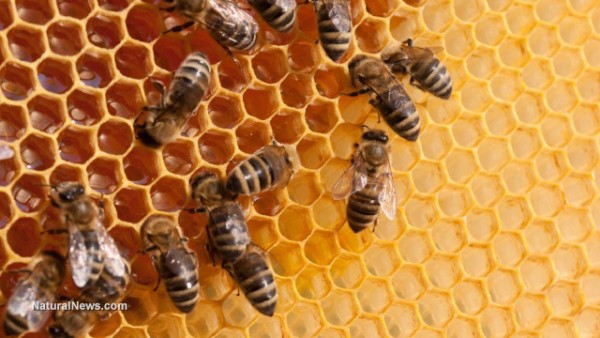
Advertisement
In a glorious display of our First Amendment rights, freedom of speech and freedom to assemble peacefully, environmental activists brought the EPA headquarters a lovely gift for their hard work — 2.6 million dead bees.
In June, beekeepers, farmers, food advocates and many others joined together and presented EPA officials with four million signatures demanding an immediate ban on bee-killing pesticides. The activists also met with some select congress members and representatives from the USDA, along with those from the EPA, and presented some two hundred letters from different businesses and organizations, as well.
The honeybee population has been devastated and is losing about 40% of its population each year. Neonicotinoids, which are types of pesticides, seem to be playing a primary role in the loss of bees.
Natural News reported in early 2016 that Minnesota lawmakers were considering banning the use of neonicotinoid pesticides entirely, because of the grievous harm they unleashed on their honeybee populations and the environment. Neonicotinoids are often applied to the soil and then absorbed by the plant. Supposedly, this is how they work best. However, this makes them especially problematic for pollinator insects, like honeybees.
While the pesticides may not immediately cause bee death, neonicotinoids may have other negative effects that can eventually lead to bee death and hive collapse. Studies indicate that neonicotinoids can interfere with their ability to forage for nectar and can even impair their memories so badly that they can’t remember how to get back to the hive.

Of course, neonicotinoids are not the only toxic agrochemicals that have been shown to be harmful to bees. Glyphosate has repeatedly been shown to be harmful to just about everything. For example, a study authored by researchers from the University of Buenos Aires in Argentina in conjunction with researchers from Free University Berlin indicated that glyphosate negatively affects honeybees. Much like neonicotinoids, glyphosate impairs the honeybees’ cognitive function, which in turn prevents them from foraging sufficiently and inhibits successful returns to the hive.
Another study also found that bees exposed to glyphosate exhibited decreased ability to eat, decreased memory, and poorer sense of smell. Bees exposed to glyphosate that were able to make it back to their hive also brought traces of the chemical home with them — exposing even more bees to the same toxin. Even non-foraging bees can be poisoned when it is being brought into their hive by almost all the other bees.
Exposure to glyphosate is nearly inevitable for the poor honeybee, and the risks are really just as certain. More than likely, honeybees are being exposed to quite a lot of glyphosate — it is one of the most widely used herbicides, after all.
Without honeybees, nearly 80% of the crop cultivation in the United States would be virtually impossible. Perhaps it’s time we start treating bees with a little respect and stop spraying their food (and ours!) with toxic chemicals. Don’t we all deserve clean, healthy food to eat?
Sources:
Submit a correction >>
This article may contain statements that reflect the opinion of the author
Advertisement
Advertisements















